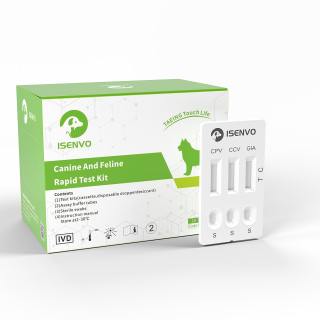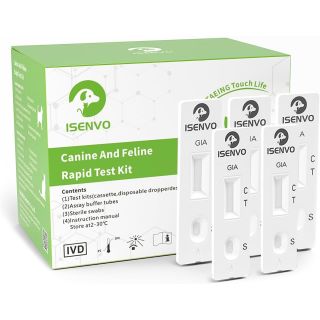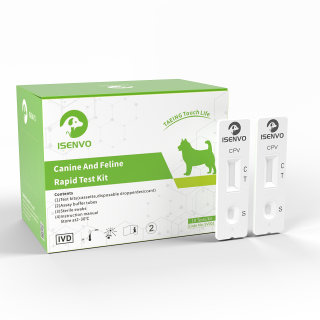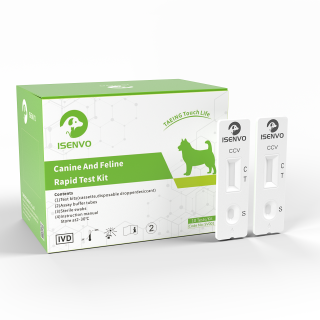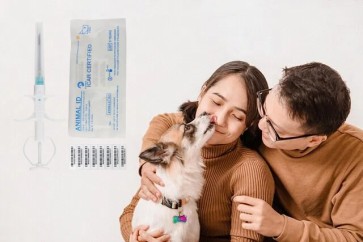As a responsible dog owner, staying informed about common canine infections is crucial for your pet’s health. Canine Parvovirus (CPV), Canine Coronavirus (CCV), and Giardia are infections that can affect dogs of all ages, leading to severe health issues if not detected and managed early. With tools like the TAEING 10 Pack Canine CPV+CCV+GIA Combined Rapid Test for Dogs, you can now easily check your dog for these infections at home.
This guide covers key information on CPV, CCV, and Giardia, how they spread, symptoms to look for, and how to detect and manage them effectively—so your dog can live a long, healthy life.
What Are CPV, CCV, and Giardia?
Canine Parvovirus (CPV): A highly contagious viral infection, CPV primarily affects puppies and unvaccinated dogs, causing severe gastrointestinal problems such as vomiting and diarrhea. Without prompt treatment, CPV can be fatal.
Canine Coronavirus (CCV): Similar to CPV but generally less severe, CCV causes mild gastrointestinal symptoms, including vomiting and diarrhea. It can still lead to dehydration and discomfort, especially in young or unvaccinated dogs.
Giardia: A parasitic infection that targets the gastrointestinal tract, Giardia causes diarrhea and dehydration in affected dogs. It spreads through contaminated water or feces, making it common in areas with poor sanitation.
Key Facts About CPV, CCV, and Giardia
Type: CPV and CCV are viral infections, while Giardia is a parasitic infection.
Main Transmission:
CPV: Spread primarily through contact with infected dogs or contaminated surfaces.
CCV: Spread via fecal-oral transmission.
Giardia: Spread through contaminated water or fecal matter.
At-Risk Dogs:
Puppies
Unvaccinated dogs
Dogs in shelters, kennels, or public parks
Dogs with compromised immune systems
How Do These Infections Spread?
CPV: CPV spreads through direct contact with infected dogs or their feces, as well as through contaminated environments like kennels or public parks.
CCV: Dogs can contract CCV from ingesting fecal material from an infected dog, making unsanitary conditions a breeding ground for the virus.
Giardia: This parasite is often found in contaminated water sources, including lakes and rivers, as well as areas where dogs frequent, such as parks.
Recognizing CPV, CCV, and Giardia Symptoms
These infections manifest in different ways, but common symptoms include:
Canine Parvovirus (CPV):
Severe, bloody diarrhea
Vomiting
Dehydration and weight loss
Lethargy and loss of appetite
Canine Coronavirus (CCV):
Vomiting
Diarrhea (may not be as severe as CPV)
Decreased appetite
Lethargy
Giardia:
Diarrhea (often foul-smelling, watery)
Vomiting
Dehydration and weight loss
Poor coat condition
Detecting CPV, CCV, and Giardia Early
Early detection of these infections is essential for effective treatment. While your veterinarian will conduct comprehensive tests, you can also use home testing kits to screen your dog for these infections from the comfort of your home.
At-Home Screening with TAEING Test Kit
The TAEING 10 Pack Canine CPV+CCV+GIA Combined Rapid Test for Dogs allows dog owners to quickly check for CPV, CCV, and Giardia in just 10 minutes. This easy-to-use test requires only a small sample, and results are delivered fast, helping you take action early if your dog is at risk.
A positive result from this home test should always be followed by a confirmation from your veterinarian to ensure accurate diagnosis and treatment.
Veterinary Confirmatory Tests:
PCR (Polymerase Chain Reaction) tests for CPV and CCV
Fecal tests for Giardia
Full blood panels to assess overall health
Managing CPV, CCV, and Giardia Infections
While there’s no cure for CPV or CCV, early detection and appropriate care can dramatically improve your dog’s recovery chances. For Giardia, medications like metronidazole and fenbendazole are often prescribed to eliminate the parasite.
Recommended Care Strategies:
Hydration: Ensure your dog is well-hydrated, especially if vomiting or diarrhea is present.
Medication: Follow your vet's prescribed treatments for infections.
Diet: Provide a nutritious, easily digestible diet to support recovery.
Isolation: Keep infected dogs away from healthy ones to avoid transmission.
For CPV:
Supportive care (fluids, antibiotics, etc.) is essential. Severe cases may require hospitalization.
For CCV:
Symptomatic treatment for vomiting and diarrhea is typically enough for recovery in most cases.
For Giardia:
Anti-parasitic treatments are highly effective, but maintaining hygiene to prevent reinfection is key.
Prevention Tips
You can reduce the risk of these infections with a few proactive steps:
Prevention Tips:
Vaccinate your dog: Ensure your dog is vaccinated for CPV and CCV to prevent these viral infections.
Hygiene: Clean your dog’s living space regularly and provide fresh, clean water to prevent Giardia infection.
Avoid risky areas: Limit exposure to areas with poor sanitation or high dog traffic, like dog parks and shelters.
Test new dogs: If introducing a new dog to your household, consider testing them for CPV, CCV, and Giardia using the TAEING Rapid Test Kit.
Outlook for Dogs with CPV, CCV, and Giardia
With the right care, dogs infected with CPV, CCV, or Giardia can recover fully and live happy, healthy lives. The key is early detection, prompt treatment, and supportive care.
Common Questions
Can humans get CPV, CCV, or Giardia?
No, these infections are specific to dogs, and Giardia is a species-specific parasite that does not affect humans.
Can dogs with CPV, CCV, or Giardia live with other dogs?
Dogs infected with CPV or CCV should be isolated to prevent spreading the virus. However, dogs with Giardia can usually coexist with others after treatment, but good hygiene is crucial.
Are home tests reliable?
Home tests like the TAEING Canine CPV+CCV+GIA Combined Rapid Test are accurate for initial screening, but positive results should always be confirmed by a veterinarian.
Final Thoughts
While infections like CPV, CCV, and Giardia can be concerning, being informed and taking proactive steps can help your dog stay safe. The TAEING 10 Pack Canine CPV+CCV+GIA Combined Rapid Test for Dogs offers an easy and efficient way for dog owners to detect these infections early and act quickly.
Early detection and veterinary care can make a world of difference, ensuring your dog’s health and happiness for years to come.




